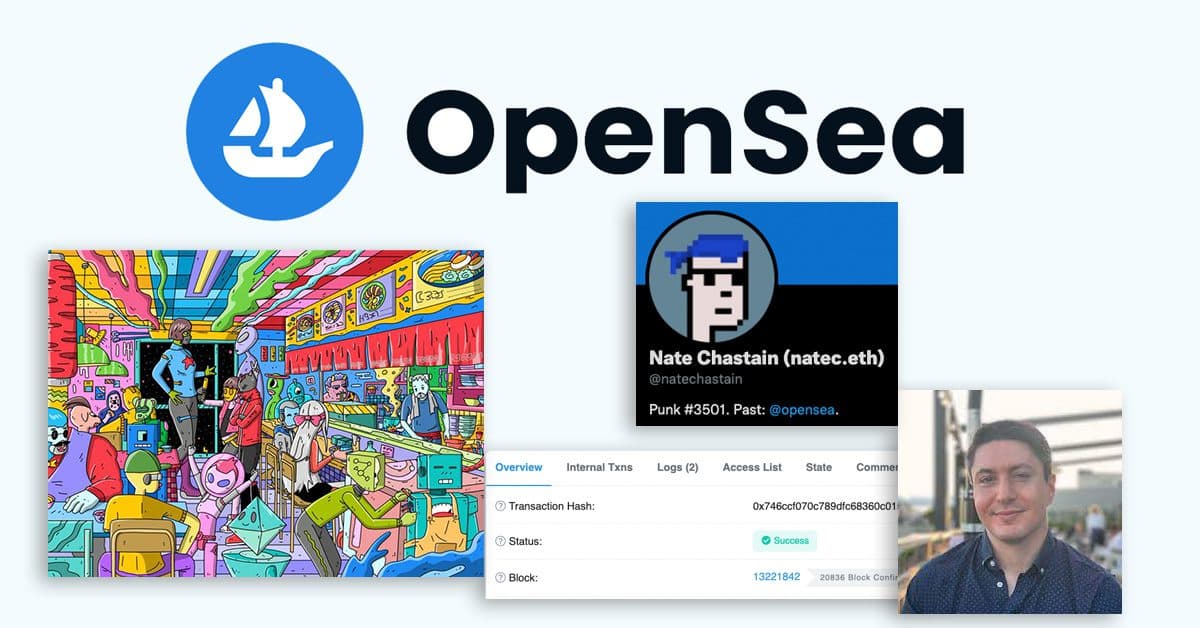OpenSea’s Nate Chastain Calls it Quits After Insider Trading Allegations
Twitter users flagged suspicious transactions on Etherscan, leading to the company to admit that an employee used inside knowledge to front run the market.

"Spectrum Of A Ramenfication Theory" NFT by Dailydust; @natechastain Twitter profile; Photo: Nate Chastain’s Github
- Chastain is alleged to have purchased NFTs before they were posted publicly, profiting from their subsequent rise
- In a blog post, OpenSea CEO Devin Finzer said he had accepted Chastain’s resignation and new rules have been put in place to prevent such behaviour from happening again
The executive at the center of an insider trading scandal involving one of the largest NFT marketplaces has resigned.
Nate Chastain, OpenSea’s former product head, suspected of profiting from inside information, updated his Twitter profile to say “Past: @opensea” mid-Thursday New York time. Other media reports have said that OpenSea CEO Devin Finzer specifically asked Chastain to resign. In a blog post, the company admitted that someone in the company was doing this, but didn’t specifically name Chastain.
Earlier this week a number of NFT traders on Twitter noticed that a wallet belonging to Chastain was always at the center of transactions involving NFTs that would appear on the front page of OpenSea.
From data compiled by 8BTCNews, Chastain is said to have made 19 ether, or around $67,000.
Chastain’s wallet address is known in part because of his public display of CryptoPunk Punk #3501, currently valued at upwards of $340,000, according to DeFi dashboard Zapper.
Insider and wash trading a concern for NFT industry
In an August report, crypto research house Nansen cautioned that it detected possible signs of wash trading from some of the largest token founders and markets.
“While something appears amiss, it definitely isn’t incriminating evidence of wash trading, because they aren’t being sold directly to each other,” Nansen analyst Ling Young Loon is quoted in Bloomberg as saying. “The wallets that they eventually sell to may be related, but that would require a much more rigorous study.”
As early as January 2020, NonFungible, a data and news site was raising concerns about the prevalence of wash trading within the NFT market as a way for founders to build hype around their tokens.
Even the most famous sale of an NFT, the $69.3 million tagged “Beeple’s Everyday: The First 5000 Days” in March via Christie’s auction house, is dogged by shades of wash trading, according to crypto blogger Amy Castor.
Metakovan is also behind Singapore-based Metapurse, a crypto-based investment firm. Metapurse’s mission, according to its website, is to “democratize access and ownership to artwork.” The firm has been acquiring NFTs. It purchased Beeple’s “Everdays: 20 Collection” artworks for $2.2 million in December.
Metapurse offers fractionalized ownership of all of Beeple’s works via its proprietary B20 token. Beeple, the artist, owns 2% of all the B20 tokens, according to Castor. Not the same level of wash trading as to what Chastain is alleged to have done, but a problematic conflict of interest nonetheless.
At the time of the auction of Beeple’s work, each B20 was worth just under $25, according to CoinGecko. Now each token is worth around 92 cents.
Recent data from NonFungible estimates that the secondary market has nearly 45,000 active buyers versus the 25,000 in the primary market, along with much higher USD volume being traded, fueling concerns that some portion of NFT volume may be spurius.
Are you a UK or EU reader that can’t get enough investor-focused content on digital assets?Join us in London on November 15th and 16th for the Digital Asset Summit (DAS) London. Use code ARTICLE for £75 off your ticket. Buy it now.






